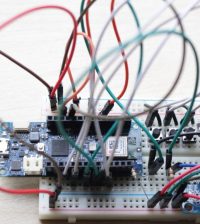- makeITcircular 2024 content launched – Part of Maker Faire Rome 2024Posted 2 weeks ago
- Application For Maker Faire Rome 2024: Deadline June 20thPosted 2 months ago
- Building a 3D Digital Clock with ArduinoPosted 7 months ago
- Creating a controller for Minecraft with realistic body movements using ArduinoPosted 7 months ago
- Snowflake with ArduinoPosted 8 months ago
- Holographic Christmas TreePosted 8 months ago
- Segstick: Build Your Own Self-Balancing Vehicle in Just 2 Days with ArduinoPosted 8 months ago
- ZSWatch: An Open-Source Smartwatch Project Based on the Zephyr Operating SystemPosted 9 months ago
- What is IoT and which devices to usePosted 9 months ago
- Maker Faire Rome Unveils Thrilling “Padel Smash Future” Pavilion for Sports EnthusiastsPosted 10 months ago
PGCPSU – Pretty Good Cheap Power Supply Unit on Kickstarter

PGCPSU is a three in one power supply board and it integrates a lithium battery charge management circuit with 5V and 3.3V DC-DC converter-based output rails to power most projects in a very compact form factor.
This affordable yet powerful LiPo PSU module is available on Kickstarter from just €7 and worldwide deliveries expected to take place sometime around May 2019.
Features and specifications of the LiPo PSU module include :
- 5V output rail providing at least (*) 350mA
- 3.3V rail providing at least (*) 400mA
- low quiescent current (49uA for the 5V rail + 57uA for the 3.3V rail)
- enable/disable pin for the 3.3V rail with selectable default state solder jumper
- micro USB input or pin header for charging (4.7V to 6V max.)
- high efficiency even at low load (important for great battery life!)
- small / tiny with only 25x20mm
- good line regulation
- quick charging at up to 1.9A (fully charges our awesome 2600mAh cell in just over 2h!)
- integrated battery protection (including reverse polarity protection!)
- good fault tolerance and recovery behaviour (over-discharge, short circuit/over-current etc…)
On Kickstarter crowdfunding page the developers behind the PGCPSU also provide some possible applications for the PSU module:
- Running the Arduino Blinky sketch for 3,5 days (or over 25 days with a bit of tweaking like removing the power LED, disabling the USB-UART, bypassing the LDO, using sleep states etc….)
- Running a Raspberry PI Zero W posting its uptime to a REST API via WiFi for 17 hours
- Running an ESP8622 based soil moisture and temperature sensor for … well it’s been running for 4 months now, posting a measurement every 10 minutes …same for an ESP8622 based WiFi / PIR motion sensor
- Using it as an uninterruptible power supply for an Arduino based test data acquisition system (not ideal for the Lithium cell for sure – but it works superbly)
















